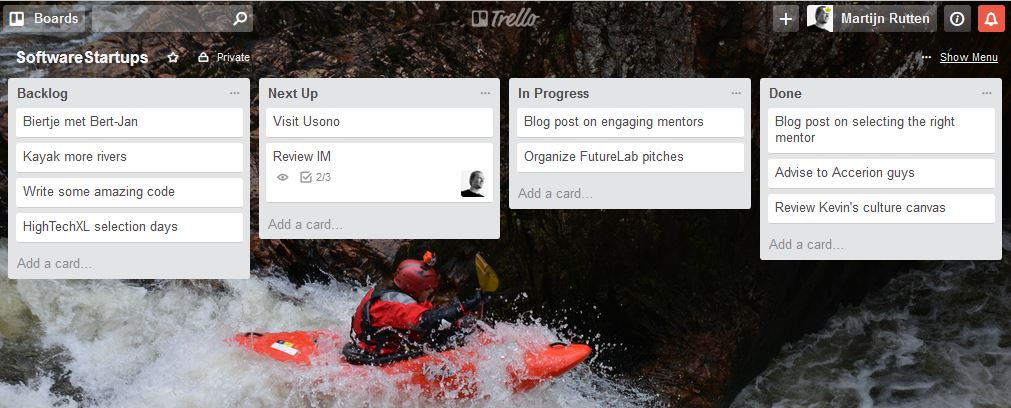
A good mentor can make all the difference for your startup. This goes so far that investors assess startup teams by their ability to surround them with the right pool of mentors and coaches.
Previously, I wrote about how to build up such a mentor pool and make sure you select those mentors that will make your business go through the roof. In the few years that I have mentored all kinds of startups, I learned that not only selecting the right mentor counts. How you subsequently engage the mentor and get the best out of them is equally important.
Here are my 10 lessons learned to engage your mentors, several of these from best practices at the HighTechXL accelerator in The Netherlands.
The successful startup teams are the ones that know how to get the right help at the right time. Build a pool of mentors for every aspect of your business. Legal, sales, marketing, development, investment, subsidy, academic research, HR, finance, tax, IP and patents to name a few.
Most mentors are busy and won’t dance until you ask. I had startups ask me to be their lead mentor only to never hear from them again. Most startup accelerators distinct between “ad-hoc” and “lead” mentors that explicitly reserve time for you. You’ll be amazed at how often ad-hoc mentors will make time for you when you ask a concrete question and involve them!
Make lists of every mentor you have access to ordered by their specialty. Whenever a key question pops up, you instantly know who you gonna call.
Get into a rhythm with your lead mentors. A mentor can’t help you if he/she doesn’t know what’s going on.
If you have multiple mentors in the same field, e.g., all reviewing your investment memorandum, make sure they get to hear each others comments. The interaction is not only great added value for the mentor, but also helps to not get pushed in all different angles from mentors with opposite views.
Eat more pizza. New office, investment deal, first customer, birthday of a founder, or just because the beer was on sale that day: include your mentors in the celebration.
Your mentors are at the same time your ambassadors towards customers and investors. Better make sure to give them the power to speak up.
Realize that a mentor has a deep insight in the qualities of your team and bought into your value proposition. Read Seth Godin’s free ebook on the inverted funnel and you’ll instantly see the importance.
Include a specific question for support each time the newsletter goes out. A weekly update is not only a great way to keep ad-hoc mentors in the loop, but also a way to extend your message to their network.
 Using Trello as Kanban-like board is a great way to organize your company tasks and plans. Share this with your mentors! Keep ’em in the loop. You have nothing to hide. Plus you get to assign tasks to your mentors and monitor these.
Using Trello as Kanban-like board is a great way to organize your company tasks and plans. Share this with your mentors! Keep ’em in the loop. You have nothing to hide. Plus you get to assign tasks to your mentors and monitor these.
Why not maintain a task board for all of your mentors? Keep track of their actions just like you do for your employees or customer interactions. Trello is a simple way to capture emails, notes, action points and get reminders. A simple board with columns like Backlog, Next up, In progress, Blocked, and Done will do just fine. (And no, I don’t have shares in Trello, just a fan.)
WhatsApp, slack, phone, or pidgeon. Each person has its own preference for getting contacted. Your emails may be drowned in their overfull inbox. You can use the excellent project Culture Canvas to cover the bases of cooperation (at least use it for your own team, but that’s another blog post).
Regularly. Together with the mentor(s). Say goodbye and thank you when the mentor adds no (more) value. Keep your mentor pool fresh.
Cover your legals: NDA, liability and insurance if you are into that kind of thing, potential payments or stock, but also how to break up. I am actually surprised to see startup accelerators with a large pool of mentors that do not enforce this. What if a mentor spills your secret sauce in the media? What would happen to the mentor pool if a startup sues a mentor for some unlucky advice?
On a positive note, you just may be eligible for a subsidy in working with a particular mentor, e.g., a the Dutch Starters International Business vouchers to work with a coach to plan your international expansion. Don’t forget to tap into these subsidies if you can.
What do you do to get the most out of your mentors?

About Martijn Rutten
Fractional CTO & technology entrepreneur with a long history in challenging software projects. Former CTO of scale-up Insify, changing the insurance space for SMEs. Former CTO of fintech scale-up Othera, deep in the world of securitized digital assets. Coached many tech startups and corporate innovation teams at HighTechXL. Co-founded Vector Fabrics on parallelization of embedded software. PhD in hardware/software co-design at Philips Research & NXP Semiconductors. More about me.
Related Posts